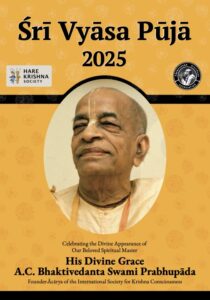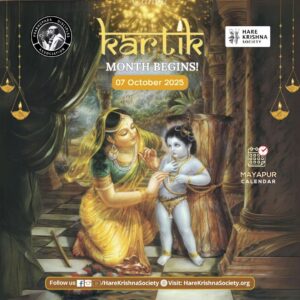Concentrated reading of Srila Prabhupadas books is a form of samadhi-smaranam
The following purport is taken from SB 7th canto where Prabhupada describes the 9 process of bhakti
(3) Smaraṇam. After one regularly performs the processes of hearing and chanting and after the core of one’s heart is cleansed, smaraṇam, remembering, is recommended. In Śrīmad-Bhāgavatam (2.1.11) Śukadeva Gosvāmī tells King Parīkṣit: etan nirvidyamānānām icchatām akuto-bhayam yogināṁ nṛpa nirṇītaṁ harer nāmānukīrtanam
“O King, for great yogīs who have completely renounced all material connections, for those who desire all material enjoyment and for those who are self-satisfied by dint of transcendental knowledge, constant chanting of the holy name of the Lord is recommended.” According to different relationships with the Supreme Personality of Godhead, there are varieties of nāmānukīrtanam, chanting of the holy name, and thus according to different relationships and mellows there are five kinds of remembering. These are as follows: (a) conducting research into the worship of a particular form of the Lord, (b) concentrating the mind on one subject and withdrawing the mind’s activities of thinking, feeling and willing from all other subjects, (c) concentrating upon a particular form of the Lord (this is called meditation), (d) concentrating one’s mind continuously on the form of the Lord (this is called dhruvānusmṛti, or perfect meditation), and (e) awakening a likening for concentration upon a particular form (this is called samādhi, or trance). Mental concentration upon particular pastimes of the Lord in particular circumstances is also called remembrance. Therefore samādhi, trance, can be possible in five different ways in terms of one’s relationship. Specifically, the trance of devotees on the stage of neutrality is called mental concentration.
-
-
pāda-sevanam. According to one’s taste and strength, hearing, chanting and remembrance may be followed by pāda-sevanam. One obtains the perfection of remembering when one constantly thinks of the lotus feet of the Lord
-
(5)Arcanam- There are two systems of arcana—the bhāgavata system and pāñcarātrikī system. In the Śrīmad-Bhāgavatam there is no recommendation of pāñcarātrikī worship because in this Kali-yuga, even without Deity worship, everything can be perfectly performed simply through hearing, chanting, remembering and worship of the lotus feet of the Lord.
It is therefore recommended that initiated devotees follow the principles of Nārada-pañcarātra by worshiping the Deity in the temple. Especially for householder devotees who are opulent in material possessions, the path of Deity worship is strongly recommended. An opulent householder devotee who does not engage his hard-earned money in the service of the Lord is called a miser. One should not engage paid brāhmaṇas to worship the Deity. If one does not personally worship the Deity but engages paid servants instead, he is considered lazy, and his worship of the Deity is called artificial. An opulent householder can collect luxurious paraphernalia for Deity worship, and consequently for householder devotees the worship of the Deity is compulsory. In our Kṛṣṇa consciousness movement there are brahmacārīs, gṛhasthas, vānaprasthas and sannyāsīs, but the Deity worship in the temple should be performed especially by the householders. The brahmacārīs can go with the sannyāsīs to preach, and the vānaprasthas should prepare themselves for the next status of renounced life, sannyāsa. Gṛhastha devotees, however, are generally engaged in material activities, and therefore if they do not take to Deity worship, their falling down is positively assured. Deity worship means following the rules and regulations precisely. That will keep one steady in devotional service. Generally householders have children, and then the wives of the householders should be engaged in caring for the children, just as women acting as teachers care for the children in a nursery school.
Gṛhastha devotees must adopt the arcana-vidhi, or Deity worship according to the suitable arrangements and directions given by the spiritual master. Regarding those unable to take to the Deity worship in the temple, there is the following statement in the Agni Purāṇa. Any householder devotee circumstantially unable to worship the Deity must at least see the Deity worship, and in this way he may achieve success also. The special purpose of Deity worship is to keep oneself always pure and clean. Gṛhastha devotees should be actual examples of cleanliness.
Deity worship should be continued along with hearing and chanting. Therefore every mantra is preceded by the word namaḥ. In all the mantras there are specific potencies, of which the gṛhastha devotees must take advantage. There are many mantras preceded by the word namaḥ, but if one chants the holy name of the Lord, he receives the result of chanting namaḥ many times. By chanting the holy name of the Lord, one can reach the platform of love of Godhead. One might ask, then what is the necessity of being initiated? The answer is that even though the chanting of the holy name is sufficient to enable one to progress in spiritual life to the standard of love of Godhead, one is nonetheless susceptible to contamination because of possessing a material body. Consequently, special stress is given to the arcana-vidhi. One should therefore regularly take advantage of both the bhāgavata process and pāñcarātrikī process.
Deity worship has two divisions, namely pure and mixed with fruitive activities. For one who is steady, Deity worship is compulsory. Observing the various types of festivals, such as Śrī Janmāṣṭamī, Rāma-navamī and Nṛsiṁha-caturdaśī, is also included in the process of Deity worship. In other words, it is compulsory for householder devotees to observe these festivals.
Offenses to be avoid—just some of them listed below…
to spit while worshiping the Deity, (j) to advertise one’s glory while worshiping the Deity, (k) to apply tilaka to one’s forehead in a curved way, (l) to enter the temple without having washed one’s feet, (m) to offer the Deity food cooked by an uninitiated person, (n) to worship the Deity and offer bhoga to the Deity within the vision of an uninitiated person or non-Vaiṣṇava, (o) to offer worship to the Deity without worshiping Vaikuṇṭha deities like Gaṇeśa, (p) to worship the Deity while perspiring, (q) to refuse flowers offered to the Deity, (r) to take a vow or oath in the holy name of the Lord.
If one commits any of the above offenses, one must read at least one chapter of Bhagavad-gītā. This is confirmed in the Skanda-Purāṇa, Avantī-khaṇḍa. Similarly, there is another injunction, stating that one who reads the thousand names of Viṣṇu can be released from all offenses. In the same Skanda-Purāṇa, Revā-khaṇḍa, it is said that one who recites prayers to tulasī or sows a tulasī seed is also freed from all offenses. Similarly, one who worships the śālagrāma-śilā can also be relieved of offenses. In the Brahma-ṇḍa Purāṇa it is said that one who worships Lord Viṣṇu, whose four hands bear a conchshell, disc, lotus flower and club, can be relieved from the above offenses. In the Ādi-varāha Purāṇa it is said that a worshiper who has committed offenses may fast for one day at the holy place known as Śaukarava and then bathe in the Ganges.



